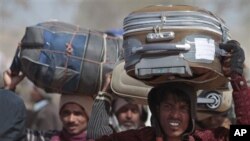The violent civil unrest in Libya is creating a humanitarian crisis, particularly on the border with Tunisia where over one-hundred thousand people crossed to flee the violence. The United States estimates that there were third-country nationals from roughly twenty-three nations along the Libya-Tunisia border. Many of these citizens were from Egypt.
In response to the deteriorating humanitarian condition, President Barack Obama approved the use of U.S. military aircraft to help Egyptians who had fled to Tunisia to get back home to Egypt. Several U.S. Air Force C-130 aircraft and two U.S. Marine Corps KC-130 aircraft have already transported more than six-hundred Egyptian nationals home.
The U.S. is supporting the efforts of international organizations to repatriate other third country nationals from the Tunisian border as well.
The U.S. government is already providing emergency assistance through non-governmental organizations working inside Libya, distributing non-food relief items and supporting needed health facilities in eastern Libya.
A team of persons for the State Department's Bureau of Population, Refugees and Migration, and the USAID Office of U.S. Foreign Disaster Assistance team is working on the Tunisian border with Libya and another USAID team is on the Egyptian border with Libya to help address the urgent humanitarian needs of the Libyan people.
U.S. Air Force C-130 aircraft have also delivered U.S. humanitarian relief supplies to Tunisia to help Tunisian authorities address the needs of the Libya evacuees who have come to Tunisia, including two-thousand blankets, forty rolls of plastic sheeting and 9,600 ten-liter plastic water containers.
The United States has already provided five-million dollars to the International Organization for Migration to support emergency evacuations out of the Libya-Tunisia border area. The U.S. is in the process of distributing an additional fifteen million dollars to the international organizations and nongovernmental organizations that are currently working in the area.
"The United States and the entire world," said President Obama, "continues to be outraged by the appalling violence against the Libyan people. The United States is helping to lead an international effort to deter further violence, put in place unprecedented sanctions to hold the Gadhafi government accountable, and support the aspirations of the Libyan people."
"Going forward," said President Obama, "we will continue to send a clear message: the violence must stop; Moammar Gadhafi has lost the legitimacy to lead and he must leave; those who perpetrate violence against the Libyan people will be held accountable; and the aspirations of the Libyan people for freedom, democracy and dignity must be met."




